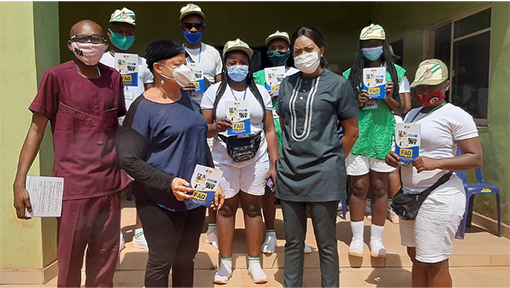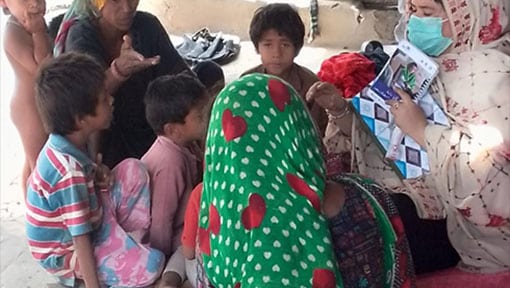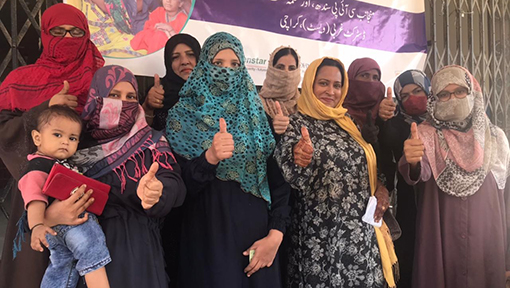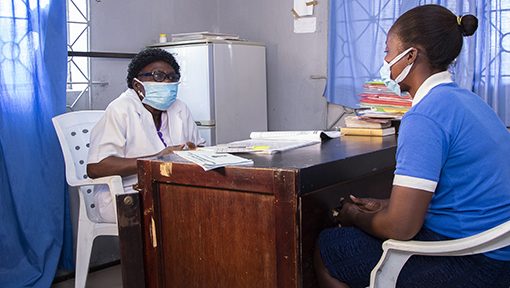Institutionalizing Social and Behavior Change Communication Interventions in Nigeria
Contributors: Dr. Olukunle Omotoso & Lisa Mwaikambo
Public health practitioners know that tailored programs that address specific social and behavioral determinants can lead to uptake of health services, including family planning. However, the role of government in addressing these determinants, and the extent to which this is done, varies greatly by country and health system. It is often not the government’s role to design and implement full scale social and behavior change (SBC) interventions as this is largely done through partners. The Challenge Initiative (TCI) in Nigeria is changing this paradigm by putting local government in the driver’s seat in planning, coordinating, managing and monitoring SBC efforts within their geographies. TCI supports state governments in their leadership and ownership functions for demand-side efforts, which ensures demand- and supply-side efforts are aligned and harmonized, and all resources and partners are coordinated in geographies to ensure maximum reach and coverage.
Institutionalizing a “Home” for SBCC Interventions in Nigeria
At first, TCI supported state governments by coaching and mentoring them to identify and/or strengthen demand-side structures, such as the Social Mobilization Committee (SMC) that dealt with seasonal social mobilization. Eventually, this evolved to the creation and strengthening of Social Behavior Change Communication Committees (SBCC), which were charged with the responsibility of coordinating all family planning SBCC and demand generation activities in the state. The SBCC Committees have now expanded to SBCC technical working groups (TWGs) with a mandate to coordinate all SBCC and demand generation activities across health programs, including family planning. With this expanded scope, the membership of the SBCC TWG has also grown to include representatives from State Ministries of Health, State Primary Health Care Development Agency (SPHCDA), Local Government Health Education/Promotion Units, other relevant government ministries/agencies, journalists from both public and private-owned media establishments, implementing partners, civil society organizations, young people and community influencers.
Sustaining the Impact of the SBCC TWG

From left to right: Dr. Frank Umeh (Head Community Health services ASPHCDA), Onyedikachi Ewe (TCI Demand Generation TSL), Prince Chris Azor (Chairman SBCC TWG), Dr. Chioma Ezenyimulu (Executive Secretary , ASPHCDA), Aneotah Egbe (TCI State Program Coordinator), and Uju Onwuegbuzina (State Health Educator, SBCC TWG Secretary), Kasmia.
The SBCC TWGs across the TCI-supported states have now become a formidable structure responding to all SBC issues in their respective states. This is evidenced by a recent advocacy win by the Anambra State SBCC TWG. Following a resource mobilization training held by TCI in Abuja, the TWG leadership paid an advocacy visit to the Executive Secretary of the Anambra SPHCDA, Dr. Chioma Ezenyimulu, to request funding support to the TWG to continue their quarterly review meetings. The Chairman of the SBCC TWG, Prince Chris Azor, shared with the Executive Secretary the TWG’s achievements and plans.
The TWG received a resounding response from the Executive Secretary as she gave an approval for a budget line to be created for continued funding of the SBCC quarterly review meetings and other related activities. The Executive Secretary noted that the SBCC TWG has been a useful platform – especially in demand generation for family planning services at primary health care centers across the state:
This is something we have to sustain and learn from their achievements as they have put together a lot of things that we have to imbibe in our communications.”
Continuing to Strengthen the Capacity of SBCC TWGs & Ensure Peer-to-Peer Learning
Although the SBCC TWGs have grown over time, they do not operate at the same level across TCI-support states. While some own and are sustaining SBC and demand generation gains in their geographies, others are still grappling with key technical issues. To better position all states for ownership and sustainability of SBC interventions while stimulating dialogue around learnings across states, TCI launched LEAD UP, a platform for learning from other state SBCC TWGs for adoption and/or adaption of high-impact SBC interventions in their respective geographies. According to its name, LEAD UP provides the opportunity for high-performing state SBCC TWGs to lead by example and share their experiences and lessons learned with state SBCC TWGs that have not reached the same heights of implementation and impact.
In response to travel restrictions due to COVID-19 and the desire to continue to learn from other states, TCI organizes quarterly LEAD UP online learning sessions that are led by the leadership of SBCC TWGs from various states. This platform provides a type of virtual study tour related to specific SBC and demand generation activities and challenges. Two sessions have been hosted thus far.
In June 2021, the team hosted a session entitled, “Sustainability Pathways to State SBC Programming in Nigeria: Lessons from Anambra and Taraba State SBCC TWG.” Taraba and Anambra state SBCC TWGs shared key steps that they are taking towards resource mobilization to ensure their sustainability. The latest session held August 25 featured the Rivers state SBCC TWG sharing experiences with “Institutionalizing SBCC Interventions Using Existing Data Platforms.” Participating in the session were Doris Nria, PhD, Health Promotion Officer/Coordinator SBCC for Rivers State Ministry of Health and Alex Porobe, Lead ICT Officer of Rivers State Primary Health Care Management Board. Mrs. Nria shared how coordination has remarkably improved in the state and shared a schema that illustrates the structure and connections between the various stakeholders involved in implementing SBC and demand generation activities across the state. This coordination has, in turn, helped the state to better plan and budget for activities as well as begin to document and monitor impact of activities, which has aided in resource mobilization efforts. For example, N10,746,813 (about $26,000 USD) has been mobilized in cash and several in-kind resources were documented and tracked. This included 567 family planning media jingles that aired pro-bono across a government-owned media station (RSTV) between July 2020 – July 2021. Actions taken because of exposure to family planning demand generation activities, such as social mobilization, are now tracked and reported to the state.

Outcomes for Rivers state social mobilization events.
The ability to collect data on SBC activities has truly been strengthened because of TCI’s coaching support. With this growing capacity, the SBC TWG sought to move beyond paper-based reporting tools to something more web-based. As a result of working across partners, they were able to easily obtain UNICEF’s support to develop a web-based dashboard which accepts and presents data from multiple sources, via a user-friendly interface allowing health workers and community informants to enter data from the community, thereby enabling access to near-real-time information on demand generation and SBC activities for COVID- 19 and other health programs, including family planning.
The dashboard is currently being piloted in two local government areas in Rivers state with plans to expand into the other LGAs. Rivers state government’s support towards institutionalizing the demand generation intervention and making sure that data is widely available and accessible is a laudable effort towards ensuring institutionalization of the high-impact interventions.






